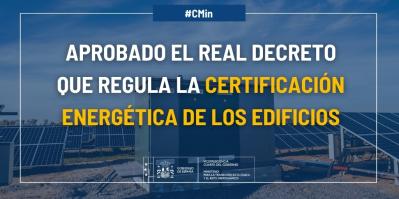

The Government passes the energy certification procedure for buildings
The new regulations set the methodology for calculating energy qualification and update the developers’ and owners’ obligations toward the buildings. The change addresses Spain’s endeavors to meet the goal of decarbonizing by 2050. Its purpose is to improve the energy efficiency of buildings, in line with the goals of the PNIEC and the Recovery Plan.
The Energy Efficiency Certificate collects the most relevant information on each building's energy situation and plays a strategic role in improving the quality of energy information and assessing its performance, both key elements to evaluating making decisions that affect the building.
This Royal Decree regulates the methodology and technical definitions for calculating the energy qualification, as well as the documentation that may be required to apply for energy certification for buildings. Moreover, it sets the minimum content of the Energy Efficiency Certificate and the conditions for obtaining the energy efficiency tag for buildings.
The law adapts energy certification to the European code by partial transposition of Directive 2018/844. It also updates the obligations of building developers and owners in terms of the technical characteristics the buildings must fulfill in energy certification matters, in relation to construction projects as well as to finished works.
Residential rehabilitation
The Royal Decree promotes activation of measures to improve the energy efficiency of buildings, in line with the goals of the National Plan on Energy and Climate 2021-2030 (PNIEC), which sets the rehabilitation of 1,200,000 homes as its goal by 2030, thereby reducing dependence on energy and emissions from buildings.
At the same time, this change in code will be key to promoting and starting up measures to improve the energy efficiency of buildings, by means of building rehabilitation, urban renewal, and modernization of the Public Administration as contemplated in the Plan for Recovery, Transformation and Resilience.
Likewise, it adds improvements in aspects of digitalization and access to information on the energy of a building, thereby making it more dynamic and easier to promote actions to rehabilitate buildings for energy purposes.
Broadening compulsory certification
Passage of this Royal Decree broadens the number of buildings obligated to hold a certificate of energy efficiency. This way, any buildings with a total net internal area greater than 500 m2 zoned for administration, healthcare, retail, residential, public, education, culture, recreation, logistics, hospitality, or sports must have their Energy Efficiency Certificate.
The same applies to buildings occupied by a public administration with a net internal area greater than 250 m2, regardless of the frequency and traffic of the public in it. This measure exceeds the minimums required in the EU, in line with the Public Administration's commitment to making buildings energy efficient.
In turn, any buildings that must by law go through the Technical Inspection of the Building (ITE) and energy rehabilitation in upcoming years will also be obliged to have this certification of energy efficiency.
A su vez, aquellos inmuebles que deban pasar obligatoriamente la Inspección Técnica del Edificio (ITE) y rehabilitaciones energéticas en los próximos años también estarán obligados a disponer de esta certificación de eficiencia energética.





